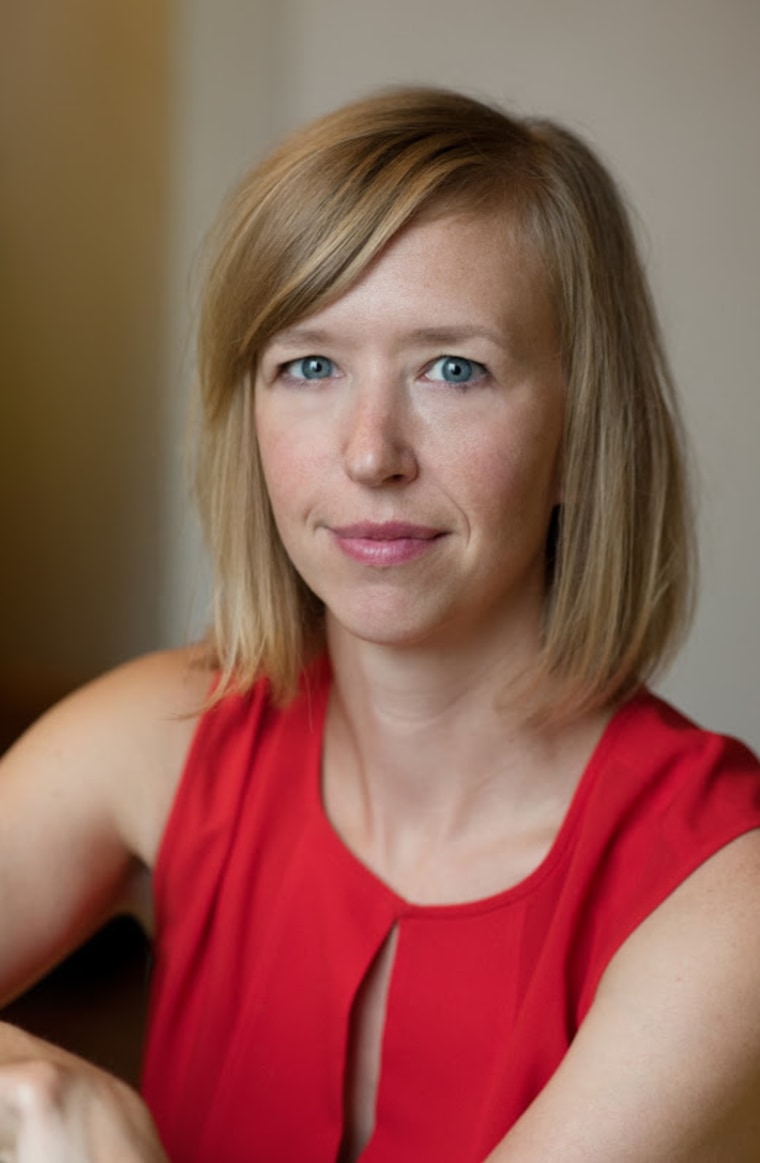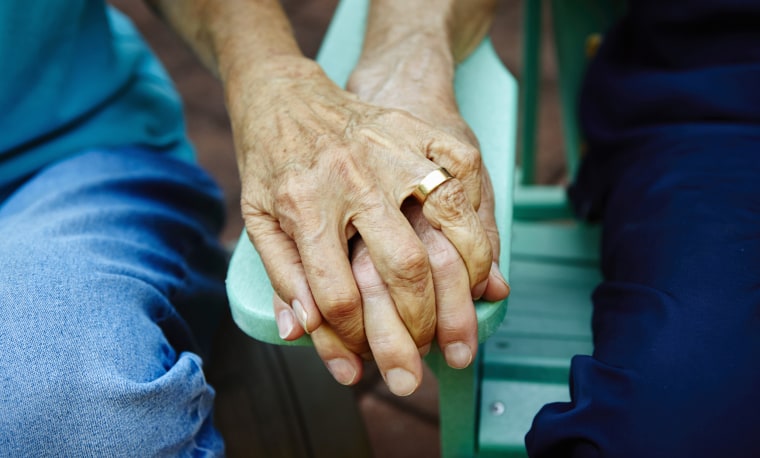Most of us look at falling in love as something that happens to us — a phenomenon that we have no control over, curated solely by destiny itself. We're presented with a person by way of chance, the right timing, a set up or good fortune. From there we date, fall in love, get married and live happily ever after; knowing intrinsically that this person is the right one.
But why do we believe this so readily, almost with blind faith?
Whether by way of pop culture delivering these narratives through TV shows, books and movies, or by hearing the stories of how our parents, grandparents and friends met and fell in love, this is the trajectory of the stories we hear most often about love.
When that storyline became problematic for author Mandy Len Catron, she decided to do some digging into this widely accepted formula in order to take control of her own love life, which she details in her new memoir, How to Fall in Love with Anyone.

"The book is very much inspired by my parent’s divorce, because it mystified me," says Catron. "In many ways, it felt like I didn't have a good understanding of love, how it works and how it's supposed to work. I felt like their divorce was the wrong ending to their love story, and I started thinking about all the ways that stories influence our thinking about love and relationships."
If the author's name sounds familiar, you likely remember her popular New York Times Modern Love piece, To Fall In Love With Anyone, Do This. In it, Catron details the night she and a date asked each other a set of 36 questions specifically designed by a psychologist to make two people fall in love — and it worked.
In How to Fall in Love with Anyone, we're afforded the backstory of the circumstances that led Catron to that fateful date and what happened afterward — much of which hinges on her examination of the common love stories made to seem like the only way to achieve romantic "success."
"Knowing that we have some choice over the role of love in our lives ... that we don't need to follow the dominant script ... is a really empowering idea."
"I didn't think about the extent to which our ideas about love relate to the social world that we live in," she says, "and so in many ways our assumptions on how love should go and how it should work and the role it should have in our lives relate to the time and place where we live. If we step back and look at some of those scripts that influence our ideas about love, it's more possible to be critical of those scripts and think very intentionally about which ones we want to practice and which ones we want to reject. Knowing that we have some choice over the role of love in our lives and that we get to decide that if it doesn't work, we don't need to follow the dominant script, is a really empowering idea."
So, is exerting more agency in love the key to finding it? Here's a look at the psychology behind the love stories we learn from, how to break from the ones that aren't serving you and a few actionable ways to harness the learnings behind the 36 questions on your quest for love — whatever that looks like for you.
How Stories Shape Our Perception of Love
Much of our perceptions and understanding of romantic relationships (and all relationships for that matter) can be traced all the way back to our childhood. "In childhood, your early relationships with parents, grandparents and loved ones formed the foundation for understanding how love and relationships work," explains Gladys Ato, PsyD. "This is the basis of attachment theory, a psychological model that explains the dynamics of human relationships.As you observed how your parents and other important figures in your childhood talked about and expressed love, you developed an internal template — or narrative — of love that shapes how you approach love as an adult."
We have this idea that love is this really profound experience, and in many ways it is. But at the same time it's very ordinary.
Of course, there are plenty of ways that this can be beneficial. But as Catron points out, the belief that the only way to live a happy life is by having a relationship that mirrors the one your parents had can be problematic, leaving you feeling confused and unsatisfied when the love you do find doesn't present itself in that same format. "We have this very dominant narrative in our culture and often it's easy to feel like that's the only way to be happy," Catron says. "But once you start to open yourself up to alternatives and see people in different types of relationships who are happy — or seek these narratives out in books, TV and movies — it becomes more possible to feel you get to create that version of love that works for you or your partner."
Erika Martinez, PsyD, practicing in Florida, says one reason this familiar model continues to be shared and perpetuated is that it creates a facade of being in control. "People love that trajectory because it feels safe and consistent," she says. "At each point, you know what's next and that gives people a semblance of control in their lives, but that's all it is — an illusion. Where I believe this hurts us most is in the strict adherence that people have to this trajectory, trying to impose it on others, and the judgment and backlash when people deviate from it. There are many ways to fall in love, each one different based on you, the other person and the season of life that each of you is in. It's also hurting us to believe that we can only love one person and that we'll live happily ever after with them. With 7.5 billion people on the planet, odds are that more than one person is a good fit for you."
Opening yourself up to the possibility that love may not look the same for you as it does for others also helps eliminate comparison, which can actually hinder your chances of making those romantic connections. "As we increasingly interact with friends and the wider world, we start to realize that other's 'normal' relationship patterns vary widely," Martinez explains. "The biggest challenge is comparison: 'Why doesn't love ever happen like that for me?' It puts people in a negative mindset, making it hard to connect with potential partners and sabotaging prospects. If one can avoid the comparison trap, the benefit is that one could observe and experience different ways of being in relationship with a partner, integrate the new experiences that resonate and shed the old patterns that no longer fit from the family of origin."
How to Find Alternate Stories
On Catron's journey to seek out love stories that deviate from what she calls the "love, marriage, baby-carriage" format, she found she needed to shake the belief that when love happens to us, it's as magical as it is in the romantic plotlines we learn from TV and movies. "We have this idea that love is this really profound experience," says Catron, "and in many ways it is. But at the same time it's very ordinary. Most of us experience love in multiple forms over the course of our lives, and there's just so much evidence that this is an ordinary experience and it shapes our lives in lots of ways — but also that a conventional romantic relationship isn't the only way to make a good life."
As for examining the way these stories and beliefs impact your own life, Ato supports following in Catron’s footsteps in seeking out alternate plotlines. "If you’re ready to update your love narrative, start by reading stories that allow your mind to expand its perspective beyond the narrative you currently have," Ato says. "Understand how your own love story that started in childhood has or hasn’t supported you, and work to update your story in a way that’s aligned with your desires."

Start shaping your own love narrative
As for the role of the 36 questions in Catron's quest, one way she says the experiment helped lead her to love was leveling the playing field where intentions and intimacy were concerned. "If you were to ask my partner Mark, he would probably say we might have fallen in love if we hadn't done this, and maybe he's right," Catron says. "I don't necessarily credit the questions entirely, but they made me a lot more comfortable. I had been online dating, and it was so unclear who [my dates] were and what they wanted. You meet them, but you don't know much about them for a while. There was so much ambiguity. Doing this survey was very daring and vulnerable for me. It made me feel like Mark and I would be close, and maybe that closeness would be a close friendship or a romantic relationship — but I wasn't worried about the form that it would take."
In her book, Catron also makes the point that we all have the story of ourselves that we offer up to strangers — an elevator pitch with surface level details. The 36 questions disrupts that comfortable story we're so used to telling, causing both parties to stray from the predictable path and open us up to a more intimate space.
Read stories that allow your mind to expand its perspective beyond the narrative you currently have.
If you're not quite ready to whip out the 36-question list on your next date, Ato says there are other effective ways to be more honest and open.
"So often we go into first dates trying to put our best foot forward, which we interpret to mean hiding the parts of us we see as weak, unsexy or vulnerable," she says. "While it’s important to showcase your best self, it’s just as important to remember that part of your best self is your authentic, raw experience." An easy way to do this is to change up the typical bar setting that so frequently serves as the location of first dates for something that pushes you out of your comfort zone. "Trust and intimacy are quickly established when an element of adventure is thrown in," Ato says. "Go on a hike. Take a rock climbing class together. Go to a comedy show (humor is great for lowering defenses and minimizing anxiety). Then, talk about the experience together to deepen your connection."
How to Fall in Love with Anyone is available for purchase at Barnes & Noble and Amazon.com.

